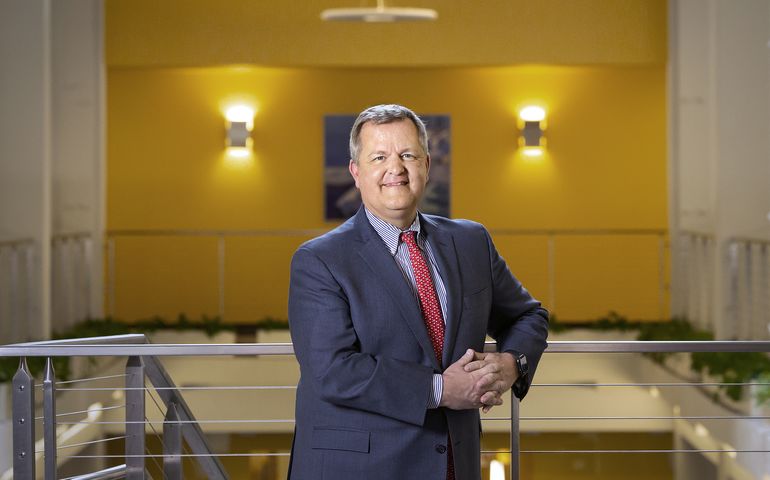MaineHealth CEO talks about staffing, COVID and why health care is a 'people' business
 Photo / Tim Greenway
MaineHealth CEO Andy Mueller oversees the state's largest health care system.
Photo / Tim Greenway
MaineHealth CEO Andy Mueller oversees the state's largest health care system.
When Andy Mueller became CEO of MaineHealth a year ago, hospitals were struggling even more than today with the personal and financial pressures of the pandemic. Maine was reeling from record-high opioid deaths. And the mental health fallout from COVID-19 had barely begun.
Not exactly great conditions for someone starting a new job. But Mueller said the issues were not unique to MaineHealth, and the health care industry would have been challenging no matter where he was.
“I’m certainly aware we were all in this fight. It didn’t matter where I was. There was a fight to be fought. We were not alone in facing this,” Mueller told Mainebiz in a recent interview. “We’re going to face challenging times still, but I remain steadfastly optimistic.”
Heading the state’s largest health care system and largest private employer through waves of the pandemic has had its pressures, Mueller admits.
“The hardest part was watching how our staff has worked tirelessly. They are tired and exhausted. They are burned out. But they are motivated around a strong desire to give back to the community,” Mueller said.
He is working to fill large shoes, succeeding Bill Caron, a 2019 Mainebiz Business Leader of the Year who retired after leading MaineHealth since its creation in 1988.
Mueller previously served as president and CEO of Centra Health in Lynchburg, Va. He now oversees a $2 billion, 23,000-employee nonprofit system that includes 637-bed Maine Medical Center in Portland, eight other hospitals in Maine and New Hampshire, and a network of primary care, behavioral health and specialized health care centers.
Mueller said MaineHealth has no plans to alter its current footprint and the communities it serves.
While the COVID-19 delta variant and omicron variant have already surged, Mueller warned he expects to see more waves of infection and hospitalization, similar to what's happening around the world.
“COVID’s not done,” Mueller said.
Ongoing challenges
Even if hospital volumes are declining as COVID surges ease at the moment, MaineHealth still faces urgent staffing needs and challenges hiring and training enough workers to meet demand.
“We’re seeing unprecedented demand from patients. We may not have as many COVID cases, but we will have continued demand. We will still need to fill staffing shortfalls with temporary labor outside the institutions,” Mueller said.
Hiring bonuses, higher wages and efforts to train more workers are just some of the ways MaineHealth is responding to the labor crunch.
One of the lessons learned from COVID include the importance and need for more telehealth services, which have become increasingly desirable with rising fuel prices and transportation challenges in the state, Mueller said.
The health system is also working with local universities to train talent who may stay in Maine. One critical area which may never fully get fixed is behavioral health and psychiatric services, Mueller admitted.
“We may never have enough psychiatrists to supply the demand. But we’re working with other providers such as primary care, nurse practitioners and others to meet the need,” Mueller said.
“Demand only got worse over the pandemic. In the military, we saw the impact of strain on psychology delayed by about 18 to 24 months. We’re just hitting the second anniversary of the pandemic and we expect to see more reaction and need related to the pandemic and psychology. It’s a stressful time. The news of the world only adds to that,” Mueller said.
Mueller is a former flight surgeon with the U.S. Air Force. He currently lives in Cumberland with his wife, and has three daughters in college.
“We’re trying to grow more talent at home. We’re competing for talent. Now, after COVID, we’re competing nationally with health care systems in other states,” Mueller said.
In February, nurses at Maine Medical Center spoke out publicly about the difficulties of treating psychiatric patients. An increasing number have become violent, the nurses said, especially in the emergency department, already maxed out because of the pandemic.
“They are really challenging patients to care for. There’s not a lot of options for care. As a result, these patients end up in the emergency departments, which are not equipped to provide care. It’s a huge challenge,” Mueller said.
MaineHealth can’t solve all the problems on its own, Mueller said. Health systems need to work together, and with state officials to solve these problems, he said.
“We can’t just wait to see a patient in a linear way. There’s got to be different ways to create access from doctor’s visits to telehealth to a chat over the Internet to proactively checking in on patients,” Mueller said. "There’s a call to action around health equity. Now it’s an essential thing to focus on. We need to partner to keep people healthier and get care sooner.
"My hope is to transform the business model. Putting patients in a hospital, providing care and getting paid isn’t working effectively. We need to align with the vision statement. We’re in a people business, we just happen to operate in the health care system."














0 Comments